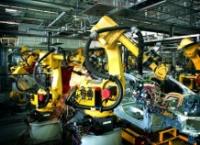 Add My Company
Add My Company
Sign In
Could a robot cost you your job?
13-02-2013

With the International Federation of Robotics (IFR) reporting that the global robot market is currently worth $25.5bn, could it mean that your workplace could become riddled with robots?
With the productivity of robots being seen as a better investment for companies, rather than using humans to do a job (which could take 10x longer to achieve for a slower outcome thus leading to money and deadline shortages), there is no surprise in finding that robots are slowly but surely taking over in the work place.
Sales of industrial robots worldwide have reached an all time high with a sales surge of $8.5bn, which is an average of 46%. Despite the weakening global economic situation, the IFR have gone on to predict that robot sales will swell by a further 9% this year. This will mean that the number of robot sales will reach 181,000, but sales are set to increase by 5% each year between 2013 and 2015, taking the annual supply above the 200,000 mark by 2015.
It seems that the IFR predicts that China will soon become the world’s biggest robot market in terms of the number of robots installed. However, China will need to install about one million robots in order to achieve similar robot densities to Japan or Germany. Interestingly, other than China, no country has shown such dynamic growth in the 50-year history of industrial robots over such a small space of time. Unfortunately for China, their success could be short lived, based upon the ending of an investment cycle in the automotive sector and a difficult global economic situation.
The current leading competitor with the largest number of robot sales is Japan, with a growth of 27% meaning sales have risen to 28,000. This is believed to be mainly due to the devastating weather conditions of the earthquake and tsunami last March, thus leading to the replacement of the systems destroyed. Closely following Japan is South Korea with robot sales reaching a staggering 20,555, a 9% increase in sales.
Now you may be wondering where all these figures have been found and if they are actually accurate. Well according to CLSA (Credit Lyonnais Securities Asia) Morten Paulsen and Edward Bourtlet, the IFR are “broadly recognised as the leading authority on global robotics market data and market research”. When it comes to calculating the results, it seems that IFR try to take a realistic approach by informing us that they do actually expect a small 2% negative growth, as they believe there will be a potential cyclical weakness in investments surrounding the developed markets in the automotive industry. Fortunately for China and other emerging markets, they will not be experiencing a negative growth for the robotics demand.
This is also good news for the world wide robotics industry, including us here at KTR. We supply a range of backlash-free couplings, such as the ROTEX GS or TOOLFLEX, into various manufacturing operations where accurate positioning is essential, for instance those which might be producing the latest generation of worker robot. We may also supply the same zero-backlash couplings as a component of end product robot itself.
While the growth in the robotics industry is good news for everyone with a stake in it’s development, what about the workers in those industries where new robots are being utilised?
Well, here’s what’s happening. Following the end of 2011, across global manufacturing, there were 55 robots actually installed per 10,000 employees. Now that may not sound like it would affect you personally, but when you look closely at what the IFR are saying, it seems that the figures for robot sales are only going to rise further.
It seems that it may only be a matter of time before human labour is outweighed by the increase of sophisticated robot technology, as many corporations and manufacturers begin to see robots as a more economical choice. These companies will begin to think that if a robot can achieve the same results as a human, but in more efficient and cost effective way, without complaints or demands for a pay rise, then why hire a human when a robot can do the same job? The global workplace could soon find itself in a changing revolution.
However, Peter Diamandis (author of Abundance and the founder of the X Prize Foundation) actually gave a rather thought provoking tweet on Twitter recently saying, “Happiness, not work is the ultimate purpose of life. If tech could provide all of your needs so you didn’t have to work, what would you do?”
So what would you do if you never had to work again because a robot could do your job for you?
Would you enjoy being able to do whatever you want in life, as and when you please?
Or do you feel you might become a recluse, with nothing more to do than twiddle your thumbs and watch daytime TV?
More importantly, if everyone were suddenly made jobless by the advent of the robot worker, would anyone have the income to buy what the robots were making?
Sources: Drives & Controls, Financial Times
For more information on Could a robot cost you your job? talk to KTR U.K. Ltd
Enquire Now
List your company on FindTheNeedle.

